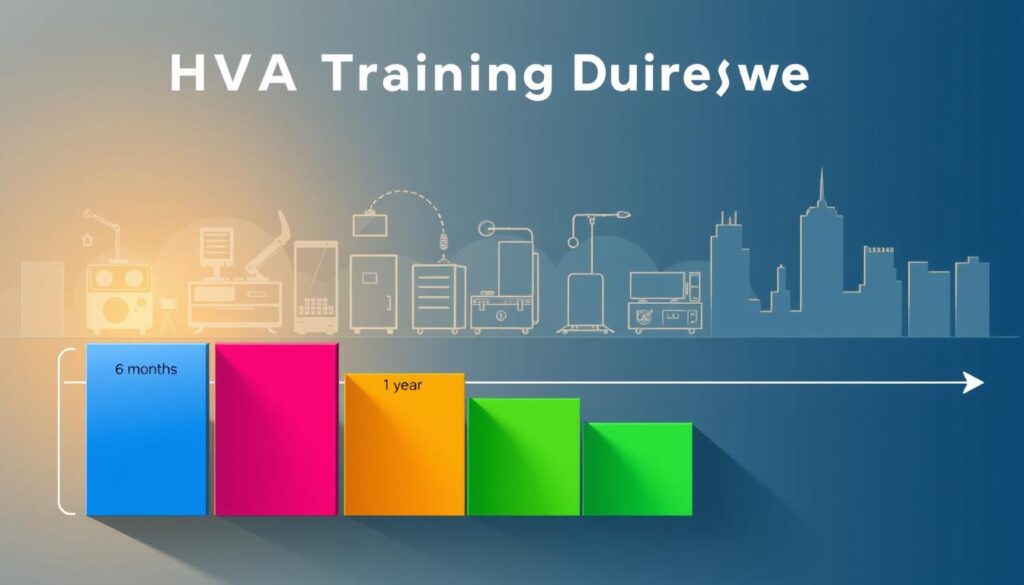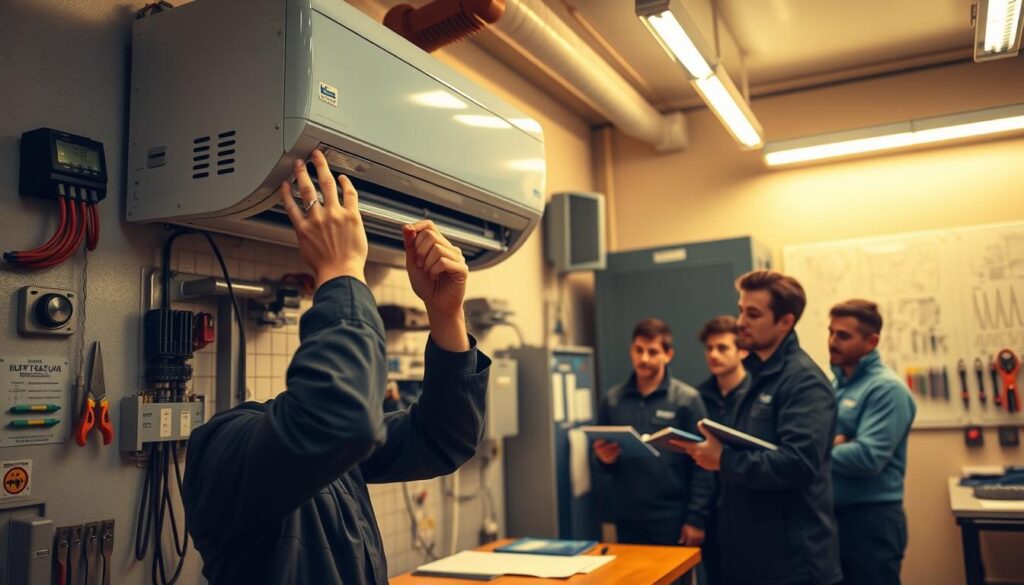Affiliate Disclosure
HVAC Guide Guys is a participant in the Amazon Services LLC Associates Program, an affiliate advertising program designed to provide a means for sites to earn advertising fees by advertising and linking to Amazon.
How Long Is HVAC Training? Are you wondering how long HVAC training takes? It’s a key step to starting a technical career. There are many paths to becoming an HVAC technician, each with its own timeline and chances.

The time it takes for HVAC training varies a lot. You can choose from quick 6-month certificate programs to longer 5-year apprenticeships. Your choice depends on your career goals, how much time you have, and how you like to learn.
The HVAC industry is full of great opportunities for those who are willing to learn. It’s expected to grow 4% by 2029, with an average salary of $48,730. This field offers a stable job and chances for growth for skilled workers.
Key Takeaways
- HVAC training can range from 6 months to 5 years
- Multiple educational paths are available, including certificates and apprenticeships
- The median annual wage for HVAC technicians is $48,730
- Hands-on training is key for success in this field
- Certification programs have a job placement success rate of over 70%
Table of Contents
Understanding HVAC Training Paths and Timelines
Choosing the right HVAC technician training is key to your career. The path you pick affects how fast you can start working. It shapes your journey in heating, ventilation, and air conditioning.
The length of your HVAC certification program varies. This gives you flexibility to fit your career and personal life. Let’s look at the main training options:
Certificate Programs: Quick Entry into the Industry
Certificate programs are the quickest way to become an HVAC technician. They offer:
- 6-12 months to finish
- Hands-on technical training
- Prep for entry-level jobs
- Lower costs than longer programs
Associate Degree Programs: More in-Depth Education
Associate degree programs give you deeper knowledge. They include:
- 2 years to complete
- General education courses
- Deeper technical training
- Potential for higher pay
Apprenticeship Routes: Earn While You Learn
Apprenticeships let you learn and earn at the same time. They offer:
- 3-5 years of training
- Classroom and on-the-job training
- Mentorship from experts
- Earning while learning
Each path has its benefits. Your choice depends on your goals, time, and money. Think about your situation before picking a training route.
How Long Is HVAC Training at Technical Schools
Technical schools have fast HVAC training programs. They help you start your career quickly. You can finish your training in 6 months to 1 year.
At schools like Apex Technical School, you can finish in just 7 months. The program includes 900 hours of training. You’ll learn in the classroom and get hands-on experience.
- Typical HVAC technical school program duration: 6-12 months
- Total training hours: Approximately 900 hours
- Training components:
- Classroom theory
- Shop experience
- Practical system training
You’ll learn important skills like working with air conditioning and heating systems. You’ll also learn about electrical controls and gas-fired systems. This makes you ready for entry-level jobs.
With HVAC jobs expected to grow 5% by 2031, technical school is a smart choice. Look for a program that mixes theory and practice. This will help you succeed in your career.
Explore Our HVAC Shop
Looking for top-rated HVAC tools, parts, and accessories? Visit our shop and find the perfect solution for your needs.
Visit the ShopCore Components of HVAC Education Programs
Starting your HVAC career means more than just sitting in a classroom. Your training covers many important parts. These parts help you get ready for a job in the technical field.
Professional HVAC programs are made to give you a strong learning experience. They mix book knowledge with hands-on skills.
Classroom Theory and Fundamentals
In the classroom, you’ll learn key technical stuff:
- Thermodynamics principles
- Electrical systems understanding
- Refrigeration cycle mechanics
- Advanced system design concepts
“Knowledge is the foundation of technical excellence in HVAC careers.” – HVAC Industry Expert
Hands-on Laboratory Experience
Getting your hands dirty is key in HVAC training. You’ll learn by doing:
- Equipment installation practice
- Diagnostic troubleshooting sessions
- Repair technique workshops
- System maintenance simulations
Safety and Industry Regulations
Safety training is a big part of HVAC education. You’ll learn about:
- OSHA safety standards
- Environmental protection protocols
- Personal protective equipment requirements
- Compliance with national and state regulations
These main parts make sure you’re ready for the HVAC world. They turn book learning into real-world skills.
Explore Our HVAC Shop
Looking for top-rated HVAC tools, parts, and accessories? Visit our shop and find the perfect solution for your needs.
Visit the ShopSkills and Knowledge Acquired During Training
Your HVAC training will give you the skills needed for success in the heating, ventilation, and air conditioning field. You’ll learn a wide range of technical abilities. These skills are essential for working with both residential and commercial HVAC systems.

- Electrical systems and circuit understanding
- Refrigerant handling and EPA certification
- Heating system installation and maintenance
- Air conditioning system diagnostics
- Blueprint reading and interpretation
You’ll learn important technical skills that employers look for. These include troubleshooting electrical and mechanical systems. Your training will also cover complex technical knowledge such as:
| Skill Category | Key Competencies |
|---|---|
| System Installation | Wiring, pipe cutting, welding, ductwork placement |
| Safety Protocols | OSHA standards, chemical handling, electrical safety |
| Technical Knowledge | Refrigeration cycles, combustion systems, electronic controls |
You’ll also gain professional competencies like customer service and problem-solving. The training focuses on practical experience. This ensures you’re ready for real-world HVAC challenges.
Your HVAC training will turn you into a skilled professional. You’ll be able to handle complex heating and cooling system needs in different settings.
Career Opportunities After HVAC Certification
Getting your HVAC certification opens up a world of exciting career options. The length of your training and certification program affects the opportunities you have in this dynamic field.
The HVAC industry has many career paths with good pay. Technicians can earn an average of $50,590 per year. This makes for a rewarding career in various sectors.
Entry-Level Positions
With your HVAC certification, you qualify for several entry-level roles:
- HVAC Apprentice
- HVAC Helper
- Maintenance Technician
- Residential Installation Technician
Advanced Career Paths
As you gain experience, your career can grow:
| Experience Level | Typical Hourly Wage | Career Opportunities |
|---|---|---|
| Entry-Level (0-1 year) | $22.47 | Apprentice Roles |
| Mid-Level (3-6 years) | $24.32 | Service Technician |
| Senior-Level (7+ years) | $32.83 | Lead Technician, Company Owner |
Specialization Options
Your certification program length can lead to specializations:
- Commercial HVAC Systems
- Industrial Refrigeration
- Green Technology Solutions
- Energy Efficiency Consulting
The HVAC industry keeps growing, with new chances for skilled workers. They must keep up with new tech and environmental trends.
Explore Our HVAC Shop
Looking for top-rated HVAC tools, parts, and accessories? Visit our shop and find the perfect solution for your needs.
Visit the ShopState Requirements and Licensing Considerations

Getting into HVAC technician training can be tricky because of different state rules. Each state has its own rules for licensing. These rules can affect how long your training takes and your career path.
Texas is a great example of how state rules can impact HVAC licensing. To become a technician in Texas, you need to:
- Have at least 48 months of jobsite experience under a licensed contractor
- Pass state-specific licensing exams
- Complete continuing education hours
The licensing process usually involves two main license classes:
| License Class | Exam Details | Work Scope |
|---|---|---|
| Class A License | 120 questions, 4-hour limit | All HVAC unit sizes |
| Class B License | 100 questions, 3-hour limit | Limited cooling and heating systems |
Your training time for becoming an HVAC technician will depend on these state rules. Most states require:
- At least 3-4 years of work experience
- Passing detailed licensing exams
- Keeping up with continuing education credits
Always check your state’s specific rules to make sure you’re on the right path to becoming a licensed HVAC pro.
Cost and Financial Aid Options for HVAC Training
Knowing the cost of HVAC training is key to making smart choices. The length of your training affects your expenses. Costs range from $1,500 to $30,000, depending on your education type.
Tuition and Program Expenses Breakdown
The length of your HVAC training affects your total cost. Here’s a breakdown of typical expenses:
- Certificate Programs: $1,200 – $15,000 (6-12 months)
- Associate Degree Programs: $15,000 – $35,000 (18-24 months)
- Apprenticeship Programs: $500 – $2,000 (3-5 years)
Financial Assistance Options
Costs shouldn’t stop you from starting your HVAC career. There are many ways to make your training more affordable:
- Federal Student Loans
- State-specific Grants
- Institutional Scholarships
- Employer Tuition Reimbursement
- Community College Affordable Rates
*Pro Tip: Community colleges typically offer the most affordable tuition rates, with in-state students paying an average of $4,864 per year.*
Many HVAC schools offer flexible payment plans. Some even have monthly payments as low as $59. Your investment in training can lead to a median annual salary of $50,590 in the HVAC industry.
Explore Our HVAC Shop
Looking for top-rated HVAC tools, parts, and accessories? Visit our shop and find the perfect solution for your needs.
Visit the ShopIndustry Certifications and Continuing Education
Your HVAC career journey doesn’t stop after initial training. Continuing education and industry certifications are key to keeping your skills sharp and meeting legal needs. The time needed for HVAC training goes beyond your first program, with ongoing learning being vital for your career growth.
Professional HVAC technicians must follow various certification paths to stay ahead. The hvac skill acquisition timeframe includes several important certifications:
- EPA Section 608 Technician Certification
- NATE (North American Technician Excellence) Certification
- HVAC Excellence Professional Level Certification
- State-specific licensing requirements
The EPA Section 608 Certification is a must for those working with refrigerants. It offers four distinct certification types:
| Certification Type | Equipment Focus | Exam Duration |
|---|---|---|
| Type I | Small Appliances | 30 minutes |
| Type II | High Pressure Appliances | 30 minutes |
| Type III | Low Pressure Appliances | 30 minutes |
| Universal | All Equipment Types | 30 minutes |
Continuing education usually needs 10-20 hours of additional training each year. These programs keep you up-to-date with new tech, safety rules, and industry standards. Most certifications need renewal, ensuring HVAC pros keep their skills sharp throughout their careers.
Investing in ongoing education is not just a requirement—it’s an opportunity to enhance your professional value and career prospects.
Conclusion
Figuring out how long HVAC training takes can seem tricky. But, it’s simple when you look at the different options. You can choose from short certificate programs to longer apprenticeships, all based on your goals and situation.
The time you spend in HVAC training depends on your choice of education. Vocational programs get you started quickly, taking 6-12 months. Associate degrees take about 2 years, giving you a deeper education. Apprenticeships offer the most hands-on experience, lasting 3-5 years.
State rules and licenses are key to your HVAC career. Each state has its own rules, from 1,000 to 4,000 hours of work experience. Some states, like Colorado and Kansas, offer easier paths. Others require specific certifications. Your dedication to learning will help you succeed in this field.
Your HVAC training is an investment in a great career. Whether you pick a quick certificate or a long apprenticeship, you’ll gain valuable skills. Stay committed to learning, and you’ll set yourself up for a bright future.
FAQ
How long does HVAC training typically take?
What are the main paths to becoming an HVAC technician?
Do I need a license to work as an HVAC technician?
How much does HVAC training cost?
How long does HVAC training typically take?
What are the main paths to becoming an HVAC technician?
Do I need a license to work as an HVAC technician?
How much does HVAC training cost?
FAQ
How long does HVAC training typically take?
HVAC training time varies. Certificate programs last 6-12 months. Associate degree programs take about 2 years. Apprenticeships can last 3-5 years. Your training length depends on your goals, available time, and learning style.
What are the main paths to becoming an HVAC technician?
There are three main paths to become an HVAC technician. You can choose from certificate programs at technical schools, associate degree programs at community colleges, or apprenticeships. Each path has its own benefits and training time.
Do I need a license to work as an HVAC technician?
Yes, most states require HVAC technicians to be licensed. You need to complete a training program, gain experience, and pass a state exam. Check your state’s licensing rules.
How much does HVAC training cost?
HVAC training costs vary. Short certificate programs cost
FAQ
How long does HVAC training typically take?
HVAC training time varies. Certificate programs last 6-12 months. Associate degree programs take about 2 years. Apprenticeships can last 3-5 years. Your training length depends on your goals, available time, and learning style.
What are the main paths to becoming an HVAC technician?
There are three main paths to become an HVAC technician. You can choose from certificate programs at technical schools, associate degree programs at community colleges, or apprenticeships. Each path has its own benefits and training time.
Do I need a license to work as an HVAC technician?
Yes, most states require HVAC technicians to be licensed. You need to complete a training program, gain experience, and pass a state exam. Check your state’s licensing rules.
How much does HVAC training cost?
HVAC training costs vary. Short certificate programs cost $1,200, while associate degree programs can cost up to $30,000. You can get financial aid, scholarships, and loans to help pay. Technical schools and community colleges are often cheaper than four-year universities.
What skills will I learn during HVAC training?
You’ll learn about electrical systems, refrigeration, and heating and cooling. You’ll also learn about system design, installation, maintenance, and safety. You’ll develop skills in reading blueprints, using tools, and understanding industry rules.
Can I work while completing my HVAC training?
Many programs offer flexible schedules. You can take evening and weekend classes to work part-time or full-time. Apprenticeships combine paid training with classroom learning, allowing you to earn while you study.
What career opportunities exist after HVAC training?
After training, you can work as a residential or commercial HVAC technician, refrigeration specialist, or maintenance technician. You can also start your own HVAC business. Specializing in solar technology or industrial refrigeration can open more doors.
Is ongoing education required in the HVAC industry?
Yes, the HVAC industry needs continuous learning. New technologies and regulations emerge regularly. Getting industry certifications, like NATE, can help you stay updated and advance your career.
What are the physical requirements for HVAC technicians?
HVAC technicians need to be physically fit. They must lift heavy equipment, work in tight spaces, climb ladders, and work in different environments. Good hand-eye coordination, strength, and stamina are key for success.
How quickly can I start working after completing training?
After finishing a certificate or associate degree, you can start working right away. Apprenticeships often lead to immediate employment. But, getting certifications and licenses may take more time and experience.
,200, while associate degree programs can cost up to ,000. You can get financial aid, scholarships, and loans to help pay. Technical schools and community colleges are often cheaper than four-year universities.
What skills will I learn during HVAC training?
You’ll learn about electrical systems, refrigeration, and heating and cooling. You’ll also learn about system design, installation, maintenance, and safety. You’ll develop skills in reading blueprints, using tools, and understanding industry rules.
Can I work while completing my HVAC training?
Many programs offer flexible schedules. You can take evening and weekend classes to work part-time or full-time. Apprenticeships combine paid training with classroom learning, allowing you to earn while you study.
What career opportunities exist after HVAC training?
After training, you can work as a residential or commercial HVAC technician, refrigeration specialist, or maintenance technician. You can also start your own HVAC business. Specializing in solar technology or industrial refrigeration can open more doors.
Is ongoing education required in the HVAC industry?
Yes, the HVAC industry needs continuous learning. New technologies and regulations emerge regularly. Getting industry certifications, like NATE, can help you stay updated and advance your career.
What are the physical requirements for HVAC technicians?
HVAC technicians need to be physically fit. They must lift heavy equipment, work in tight spaces, climb ladders, and work in different environments. Good hand-eye coordination, strength, and stamina are key for success.
How quickly can I start working after completing training?
After finishing a certificate or associate degree, you can start working right away. Apprenticeships often lead to immediate employment. But, getting certifications and licenses may take more time and experience.

